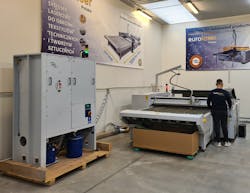Occupational health and safety fume extraction during laser processing
Eurolaser, a laser processing systems vendor, was founded in Lüneburg, Germany, in 1994 by Dipl.-Ing. Matthias Kluczinski to establish the laser technology for material processing within the industry and handcraft sector.
Today, eurolaser manufactures carbon dioxide (CO2) laser machines for cutting, engraving, and marking. “Our laser systems are designed for use in both craft work and industry. The modular construction with high-quality components guarantees quality for the most demanding applications,” says Mariusz Deptuch, CEO of eurolaser Polska, the sales and distribution partner for the Poland market. “The CO2 laser represents the heart of our laser systems and crucially contributes to the efficiency and precision of the laser processing.”
The sealed-off CO2 lasers used by eurolaser are long-lasting and maintenance-free, providing laser power of up to 600 W. And their wide-format laser cutter is dedicated for processing four groups of materials: acrylic (PMMA) and other plastics, wood, foils, and textiles.
Eurolaser Polska also provides application center services such as customer materials laser cutting tests, laser cutting performance and quality tests, prototype cutting, prototype production series, and production support.
Airborne pollutant removal
Laser processing produces unwanted byproducts such as laser fume and laser dust, and the energy input during processing triggers pyrolytic and oxidation processes that release a caustic, toxic mix of aerosols, gases, and nanoparticles. The latter are extremely hazardous, because during inhalation they overcome the lung-blood barrier and enter the nervous system. But it is not merely a matter of human health—machinery and products may also be impacted or damaged by laser fumes that can build up layers of contamination.
To prevent this, eurolaser uses a fume extraction system for air purification. More than 15 years ago, the company entered into an agreement with ULT AG (Löbau, Germany), a vendor of air technology solutions.
“ULT is a long-standing technical partner of eurolaser GmbH,” says Deptuch. “Many years of knowledge and experience developed jointly by our partners is the best guarantee of the quality and functionality of the air filtration solutions we use for our laser systems.”
In 2020, in the midst of the COVID-19 pandemic and uncertain future prospects, eurolaser Polska purchased a LAS 800 laser fume extraction system to use with their eurolaser L-1200 200-W conveyor laser system dedicated to cutting technical textile directly from the roll (see Fig. 1).
“We needed a very flexible laser fume filtration unit, because the range of different kinds of materials described as technical textile is quite wide and depends on market sector,” says Deptuch. “We cut different kinds of materials and their sandwich combinations, which generates different types of laser emissions. Laser fumes must be removed quickly and effectively to protect the health of the laser cutter operator and to prevent contamination of the machine and product.”
Laser processing tasks and their challenges for fume extraction
Eurolaser Polska provides solutions to various markets including the automotive industry where it addresses applications involving cutting nylon for airbags and spacer materials for seat systems. For upholstery applications, eurolaser cuts materials like polyethylene (PE)/polyester (PES)/foams in sandwich combinations.
“The most difficult application in this market sector is cutting different kinds of carpets where we have combinations or core material like thermoplastics such as acrylonitrile-butadiene-styrene (ABS)/polyethylene terephthalate (PET) with layers of foams or fibers,” says Deptuch.
Another special task is cutting acoustic insulation materials with a thickness of more than 10 mm, which generates a lot of laser fumes and smoke that, without efficient filtration, hinders the operation of lasers due to the rapid contamination of optics and mechanical parts of the laser systems.
Another challenge comes with services for the military industry, which commonly involves use of lasers to cut materials such as Cordura, Velcro, Kevlar, aramid, and various types of laminates (see Fig. 2). The main challenge for effective fume filtration here is the combination of both synthetic and mineral materials.A new group of materials currently appearing in laser applications are laminates and composites. In the case of laminates, these are mainly combinations of plastics, and in the case of composites, materials based on various types of fibers (mainly glass fiber).
“The resulting laser fumes from cutting these wide range of materials is quite varied and contains, in addition to sticky particles, gases and aerosols,” says Deptuch. “This is why we were searching for a solution that would ensure long-term protection of the filters and extend their lifetime. After more than 2000 working hours, the LAS 800 laser fume extractor still suits these kinds of applications quite well and fulfills all of our requirements.”
A compact solution for eurolaser
The LAS 800 system offers a compact and versatile cartridge filter unit dedicated to laser processing applications for small- and mid-size laser systems to execute cutting, marking, welding, etc. The many upgrade and extension options within the LAS 800 laser fume extractor were another critical factor for selecting the system.
The eurolaser L-1200 conveyor system, for example, is used for laser cutting of a wide range of technical textile materials. The filter aid metering unit included in the version of LAS 800 system helps to prevent filter clogging by sticky fume particles, which provides cost savings in terms of filter exchange and replacement.
“Another great item is the additional HEPA H14 filter with a downstream sorption filter of activated carbon,” says Deptuch. “Thanks to this combination, clean air stays in the production room. We don't need to add ventilation shafts, and we save energy costs for heating during the cold months.”
Stefan Meissner | Corporate Communications
Stefan Meissner is in corporate communications at ULT (Löbau, Germany).

